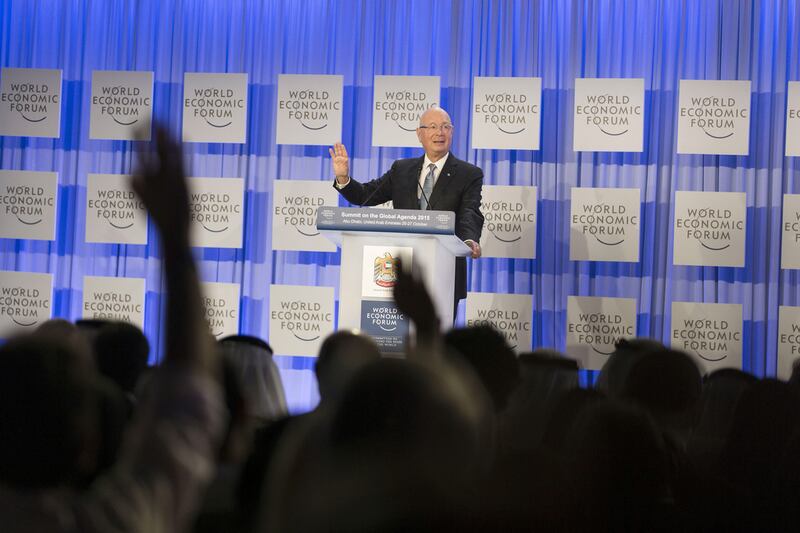It was a bravura performance by Klaus Schwab to unveil the 2015 global summit of the World Economic Forum in Abu Dhabi.
The 77-year-old founder and executive chairman of the WEF – who says he has the fitness levels of an athletic 50-year-old – led the opening plenary with obvious enthusiasm and relish. Even after 44 years of running the forum, he appears resolutely committed to “improving the state of the world”, as the WEF’s mission statement has it.
“All of you in this room must understand the power of the changes that are happening in the world. What we are seeing now will determine everything over the next 10 years, and you must not underestimate the power of the transformation ahead,” he told the 1,000-strong audience, which included leading members of the UAE Government.
The “fourth industrial revolution” and its implications for business, policymaking and governance are Mr Schwab’s latest enthusiasms. He believes that – after the great changes wrought over the past 200 years by industrialisation, mass production and computerisation (the previous three revolutions) – mankind is on the brink of a another transformational leap.
“It will not come in waves this time, like in the past. It is coming as a tsunami whose effect will be felt everywhere. You will have to show agility and entrepreneurship to survive the changes coming, because it will change everything. In the future, it is not the big fish that will eat the small fish. It will be the fast one that eats the slow,” he said in suitably apocalyptic tones.
The WEF attendees lapped it up, especially when he engaged them in what appeared to be an impromptu bit of audience interaction. “I want a show of hands. Who would you take advice from for a life-limiting illness – a human doctor or a robot? Who would you like to judge you if you are accused of a crime – a robot or a human judge?”
And who, he might have asked, would you like to run the WEF in the future – me, or somebody different, maybe younger, maybe female, maybe somebody better able to deal with the transformational era ahead?
Because that is clearly how he is thinking. This year has been transformational for the WEF organisation, and will be even more significant for Mr Schwab himself, if the changes he is proposing come to fruition.
Founded in 1971 in the Swiss Alpine town of Davos, where it still holds the annual meeting that has become its hallmark, for most of its existence the WEF was run as a Swiss non-profit making organisation, governed by that country’s corporate laws. This year, it became a fully-fledged international organisation, like the Red Cross or the World Health Organization.
That change will probably affect the running of the WEF only minimally, but a bigger change is also in the offing, as Mr Schwab explained to the summit audience. “In corporate terms, I am both chairman and managing director, but we have decided to split those roles. I intend to hand on one of them to somebody else,” he said.
Speculation about who that would be was “premature”, he added, but there are a number of candidates on his mind. Christine Lagarde, the managing director of the IMF and a member of the WEF’s board of trustees, who got a personal mention from Mr Schwab on the summit stage, is a candidate, but there are other female trustees who might be considered.
Gordon Brown, the former British prime minister who is a consultant to the WEF and was prominently in attendance at the Abu Dhabi summit, is also mentioned for a big WEF job.
Whoever takes over the baton from Mr Schwab is unlikely to tinker much with the WEF’s basic mission, not least because the founder will still be very much involved with his brainchild.
Its aim will remain to “engage political, business, academic and other leaders of society in collaborative efforts to improve the state of the world”, but there is likely to be a shift of emphasis towards offering more practical and pragmatic solutions to global problems.
“Rethinking global challenges,” is the way the WEF officially puts it.
That would help to overcome one of the abiding criticisms of the WEF – that it is a talking shop divorced from political and economic reality, “all hot air in a cold climate” as has been said of the Davos shindig.
The other criticism Mr Schwab sometimes gets from its members, whom he calls “strategic partners”, is that they pay too much for their partnership at the WEF’s series of global events. About 120 companies will be asked to stump up 600,000 Swiss francs (Dh2.2 million) this year, while another 1,000 organisations will pay 50,000 Swiss francs to be mere “participants”.
Being asked for such big fees might make some rethink their approach, or get involved instead in some other part of the proliferating global “forum industry”. r Schwab recognises the competitive threat, but believes the WEF has distinct advantages.
“We are different. We are a community, not just a conference. When we increased the fees the last time, not a single strategic partner dropped out,” he said.
In the internet age, there is also a more profound change facing the WEF and other such international talking shops. “My prediction is that in 20 or 30 years, people will not go to conferences any more. The digital dimension will change how people interact and how conferences are done,” he said.
If so, the business world would lose one of its most influential and enjoyable events. Sitting around a computer screen in a conference room in head office just would not be the same as the bracing Alpine air of Davos, or the balmy heat of Yas Island.
fkane@thenational.ae
Follow The National's Business section on Twitter





